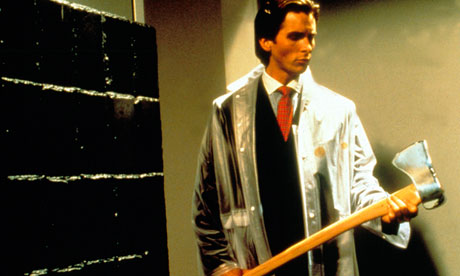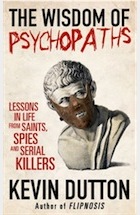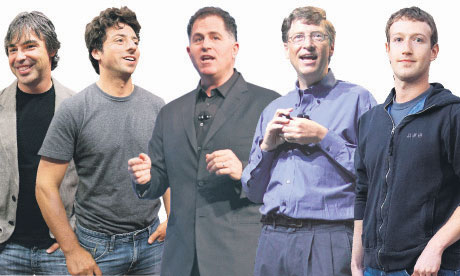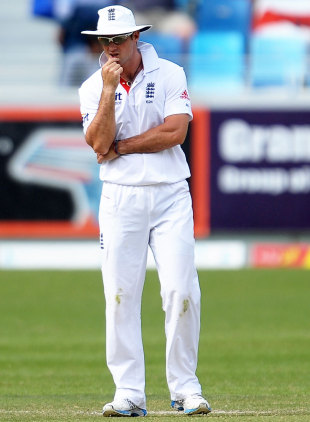Here's an interesting fact: 10 of the people on
Forbes magazine's tally of the world's 100 richest billionaires made their money from computer and/or network technology. At the top (second on the list) is
Bill Gates, co-founder of
Microsoft, whose net worth is estimated by
Forbes at $61bn, despite the fact that he continues to try to give it away. Gates is followed by Larry Ellison, boss of Oracle, with $36bn, and
Michael Bloombergwith $22bn.
Larry Page and
Sergey Brin – co-founders of Google – occupy joint 24th place with $18.7bn each.
Jeff Bezos of Amazon is No 26 with $18.4bn while the newly enriched
Mark Zuckerberg of Facebook sits at No 35 with £17.5bn. Michael
Dell, founder of the eponymous computer manufacturer, is at No 41 with $15.9bn while
Steve Ballmer, Microsoft's CEO, is three places lower on $15.7bn and Paul Allen – co-founder of Microsoft – brings up the rear at No 48 with a mere $14.2bn.
Steve Jobs, who was worth about $9bn when he died, doesn't even figure.
What's striking about this is not just the staggering wealth that these people have managed to squeeze out of what are, after all, just binary digits (ones and zeros), but how recent are the origins of their good fortunes. Mark Zuckerberg, for example, went from zero to $17.5bn in less than eight years. Microsoft – the company that has propelled Gates, Ballmer and Allen into the Forbes pantheon – dates only from 1975. Oracle was founded in 1977. Bloomberg turned a $10m redundancy cheque from Salomon Brothers into his personal money-pump in 1982. Dell started making computers in his university dorm in 1984. Bezos launched Amazon with his own savings in 1995. Brin and Page turned their PhD research into a company called Google in 1998. And Zuckerberg launched Facebook in 2004.
For some of these people, great wealth is correlated with significant power. Once Microsoft captured the market for PC operating systems and office software, Bill Gates and co ruthlessly leveraged their monopoly to eliminate rivals (remember Netscape?) and dictate pricing. So we got a world where you could have any kind of computer you wanted, provided it ran Microsoft Windows. In the era when the PC was the computer, Bill Gates was king because he controlled the PC.
But although Microsoft remains a significant force, its power waned as
computing moved from the PC to the network – and therefore to the people and companies who dominate that. Step forward the Google boys, who have the power to render any website virtually invisible, because if their algorithms decide not to index a site then effectively it ceases to exist – at least in cyberspace. Their computers also read our mail and store our documents. Google dominates the online advertising business. The company's founders say grandly that their mission is "to organise the world's information" – and they mean it. They have already digitised a significant amount of the world's printed books – although they are not yet authorised to make many of them available online. And Google's cars have photographed every street in the industrialised world.
Meanwhile, in another part of the jungle, Amazon's Bezos is not just vaporising bricks-and-mortar bookstores; he's also on his way to becoming the world's biggest publisher. And he's already the world's largest online retailer – the Walmart of the web. In
social networking Mark Zuckerberg has cunningly inserted himself (via his hardware and software) into every online communication that passes between his 900 million subscribers, to the point where Facebook probably knows that two people are about to have an affair before they do. And because of the nature of networks, if we're not careful we could wind up with a series of winners who took all: one global bookstore; one social network; one search engine; one online multimedia store and so on.
There was a time when the power exercised by computer and
internet companies seemed a matter of relatively esoteric concern. But as digital technology began to pervade our daily lives, the boundary between the "real" world ("meatspace", as geeks used to call it) and cyberspace began to blur. What happened in the latter suddenly mattered in the former – and not just in Tunisia and Egypt either. Think of the way Steve Jobs's creation – Apple – exercises such dominance over online music, smartphones and tablet computers. Or ponder what Google and Facebook now know about our lives, loves and obsessions. Or what Amazon knows about our consumption patterns. The implication is that cyberpower has correlates in the real world, which means that it's time we had a really good look at those who wield it. What are these masters of the digital universe really like? What are their values and their politics? And are they any different from the corporate moguls of the past?
Given their prominence, we know surprisingly little about our modern moguls – for various reasons. One is that we are remarkably incurious about what makes them tick. We focus instead on the fact that one of them (Zuckerberg) wears a hoodie even when being interviewed by investment bankers; or that Larry Page, co-founder of Google, refused to stop using his laptop when a big media mogul came to talk to him; or that Bill Gates used to rock furiously backwards and forwards in a rocking chair when being interviewed for an anti-trust case; or that Steve Jobs drove a comparatively modest sports car and lived in a small, old-fashioned house rather than the postmodern minimalist palace that many people would have predicted.
But this is all superficial stuff, the journalistic fluff of celebrity profiles and gossip columns. What's much more significant about these moguls is that they share a mindset that renders them blind to the untidiness and contradictions of life, not to mention the fears and anxieties of lesser beings. They are
technocrats who cleave to a worldview that holds that if something is technically possible then it should be done. How about digitising all the books in the world?
No problem: you just throw resources and technology at the task. And if
publishers protest about infringement of copyright and
authors moan about their moral rights, well, that just shows how antediluvian they are. Or how about photographing every street in Europe, or even the world? Again, no problem: it's technically feasible, after all. And if
Germans object to the resulting intrusion on their privacy, well let them complain and we'll pixelate the sods. Oh – and when we discover that those same cars have been hoovering up the details of our home Wi-Fi networks, their bosses say "
Oops! Sorry: it was a mistake." Same story with the high-resolution satellite imagery beloved of Google and – now – Apple. Same story with Mark Zuckerberg's fanatical, almost sociopathic, belief that the
default setting for life should be "public" rather than "private". The prevailing technocratic motto is: if something can be done, then it ought to be done. It's all about progress, stoopid.
Actually, it's all about values. And money. The trouble is that technocrats don't do values. They just do rationality. They love good design, efficiency, elegance – and profits. That's why one of the poster children of the industry is Apple's creative genius, Jonathan Ive, who designs beautiful kit in California which is then assembled in Chinese factories. And when the
execrable working conditions prevalent in such places are exposed, the company's senior executives profess themselves surprised and appalled and resolve to do everything they can to
ameliorate things. And we believe them – and continue eagerly to purchase the gizmos manufactured in such oppressive plants.
Why are we so credulous, so forgiving? It's partly because wealth – like political power – is a powerful aphrodisiac. But it's mainly because we accept these people at their own valuation. We've bought into their narrative. They see themselves as progressives, as folks who want to make the world a better, more efficient, more rational place. We're charmed by their corporate mantras – for example "Don't be evil" (Google) or "Move fast and break things" (Facebook). In their black turtlenecks and faded jeans they don't seem to have anything in common with Rupert Murdoch or the grim-faced, silk-hatted capitalist bosses of old. Instead of grinding the faces of the poor, our modern technology magnates move effortlessly from tech forums to
TED to
All Things D to Davos, reclining on spotlit sofas discussing APIs and cloud computing with respectful or admiring moderators. And in recent times, they are even invited to
lunch with President Obamaor as guests at political summits where they are
fawned upon by presidents and prime ministers who hope that some of the magic dust will rub off on them.
What gets lost in the reality distortion field that surrounds these technology moguls is that, in the end, they are fanatically ambitious, competitive capitalists. They may look cool and have soothing bedside manners, but in the end these guys are in business not just to make money, but to establish sprawling, quasi-monopolistic commercial empires. And they will do whatever it takes to achieve those ambitions.
The strongest link that binds them is that they are all pioneers in the exploitation of virgin territory, and that rings some historical bells. When the internet first exploded into public consciousness in the 1990s as a result of the web, many observers were reminded of what happened in the United States after the end of the civil war in 1865. Then, there was an exciting sense of a continent to be explored, gold and mineral resources to be discovered and exploited, land for anyone who was prepared to work it, industries to be founded, opportunities galore. What then followed was an explosion of speculative investment, led by railway companies which – as Anthony Trollope shrewdly observed on a visit to the US – "were in fact companies combined for the purchase of land… looking to increase the value of it fivefold by the opening of the railroad."
Thus began the era satirised by Mark Twain and Charles Dudley Warner in their novel
The Gilded Age: A Tale of Today, which was published in 1873. Twain and Warner were struck by the rampant greed and speculative frenzy of the times – not to mention its pervasive political corruption. But in that febrile milieu a smallish group of ingenious, ruthless and visionary entrepreneurs created a modern industrial state. Leland Stanford, EH Harriman, Jay Gould, Charles Crocker, Henry Plant, Henry Flagler, Cornelius Vanderbilt and Charles Yerkes built railways; John D Rockefeller created Standard Oil and brought his distinctive brand of oligopolistic order to the oil business, eventually controlling 90% of the industry; Andrew Carnegie, Henry Frick and Charles Schwab created a vast steel industry; and bankers such as JP Morgan, Joseph Seligman, Andrew Mellon and Jay Cooke organised the finance that funded these huge ventures.
In addition to building a modern industrial state, these gents amassed huge fortunes for themselves using a raft of dubious techniques, including fraud, stock-dilution, the bribing of corrupt politicians, the creation of secret cartels (ironically called "trusts") and the ruthless exploitation of poorly paid, non-unionised workers – which is why
Matthew Josephson dubbed them "robber barons" in his book of the same title. In the end, their abuses and excesses led to a legislative backlash in the form of the 1890 Sherman Anti-Trust Act, the first federal statute to limit cartels and monopolies, and to a more general public revulsion ushered in by Theodore Roosevelt's presidency in 1901. In the twilight of their lives, some of the barons (for example Carnegie, Mellon and Frick) sought to acquire public respectability – or perhaps bargaining chips for negotiating with the Almighty – by endowing charitable foundations and eponymous museums, and engaging in other public-spirited enterprises.
In comparison with these monsters of the gilded age, our contemporary moguls – Gates, Page, Brin, Ellison, Bezos et al – may look rather tame. They appear, for example, to be much more law-abiding than their 19th-century counterparts; or at any rate they have had much less success in bending lawmakers to their will. In fact, compared with the skills of the entertainment industry in suborning members of the US Congress, the technology magnates are the merest amateurs – which is why the legislators were so astonished by the
industry's vigorous reaction to Sopa, the Stop Online Piracy Act. The thought that the technology industry might actually have teeth had never previously occurred to the denizens of Capitol Hill.
We should also remember that the world in which Microsoft, Oracle, Google and Amazon operate is radically different in one important respect. The stage on which Rockefeller, Carnegie, Vanderbilt and their contemporaries strutted was predominately a national one: most of their enterprises and ambitions spanned only the continental United States, whereas the big technology companies of our day are transnational corporations that operate in a variety of different cultures and legal jurisdictions. John D Rockefeller just had to worry about fixing American officials and politicians; Larry Page, Google's CEO, has to deal not only with the US Department of Justice, but also with the European Commission, the Chinese government and Vladimir Putin's goons.
There are also radical differences in the kinds of industrial empires that the two classes of magnate have created. The 19th-century entrepreneurs built huge companies, conglomerates and cartels. They employed millions of people, operated huge plants and equipment (railways, shipping, iron and steel mills, oil refineries) and made an indelible imprint on the landscape. To use a contemporary cliche, they "shipped atoms" – physical objects. With the exception of Amazon and Apple, their modern counterparts, in contrast, are mainly in the business of shipping bits – in the form of software and online services. Despite the bleating of their PR departments, they are not huge primary employers. Google, for example, has only about
33,000 employees worldwide. And often the only tangible, physical sign of their presence and scale is the huge server farms that power their operations and which do have a significant impact on the environment – not to mention the landscape in the places where they are located.
But just because our contemporary moguls don't gouge minerals from the earth, run blast furnaces or operate oil refineries doesn't mean that their growing empires aren't real. To the physical economy created by Carnegie and co, digital technology has added a whole new economy based on information goods – nowadays embodied as ones and zeros – which may turn out to be at least as pervasive and valuable. We still make cars using steel, rubber and plastics, for example, but the value of the electronics in their engine management units and braking-control systems already exceeds the value of the vehicles' physical components. And this pattern will increasingly be replicated in other areas of economic life.
So the fact that one cannot see the information goods that Google and co gather, store, disseminate and control doesn't mean that those goods aren't real and valuable. To take just one example, Facebook now owns and controls a virtual space that will soon contain more people than the entire Indian subcontinent. Those merry throngs may delude themselves that they are cavorting in a public place. But in reality they are gathering in Master Zuckerberg's shopping mall – a fact that potentially gives him a reach and power that would make any robber baron green with envy.
Sceptics will point out that when one puts our masters of the digital universe in a historical context they aren't as rich or as important as we currently imagine. Last year, for example,
Forbes commissioned an economist to come up with an inflation-adjusted list of the richest Americans of all time, and the website Business Insider published the results.
The list is headed by those grizzled old robber barons, John D Rockefeller, Andrew Carnegie and Cornelius Vanderbilt, with $336bn, $309bn and $185bn respectively. The only contemporary figure who makes it on to the list is Bill Gates, whose net worth at its peak was estimated at $136bn – which (says the sceptic) rather puts Larry Ellison, the Google boys and Jeff Bezos into perspective.
Bubble punctured, then? Not quite. It could be that the reason Bill Gates makes it on to the inflation-adjusted list is simply that he's been around the longest. Microsoft, remember, dates from 1975 – 37 years ago. Facebook has only been going since 2004. Who knows where Zuckerberg and the Google boys will be in 2041? The digital economy has a lot more growth left in it. As Churchill might have said, we haven't yet reached even the end of the beginning.
But perhaps the most intriguing question about these two different groups of industrial magnates concerns their legacies. The industries and enterprises founded by the robber barons of the 19th century still endure – though in some cases (steel, for example) the action has moved to Asia and parts of the developing world. What, one wonders, will endure of Google, Facebook, Oracle and Amazon? And what will be their founders' legacies? And here we get a clue from the robber barons of the 19th century. Many years after their deaths we still recognise the names of John D Rockefeller and Andrew Carnegie. Will Zuckerberg and Page enjoy the same level of name-recognition among our great-great-grandchildren?






